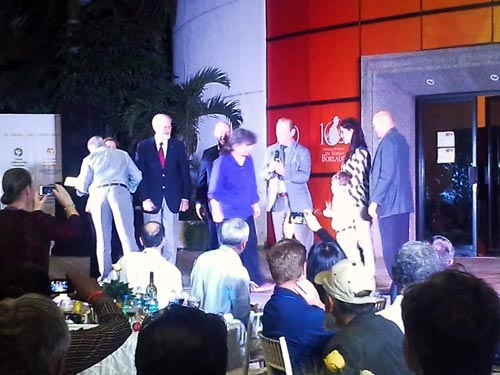By Brenna Goth/CIMMYT
Check out the Storify recap here.
Wheat’s importance in the world was the focus of day three of the Borlaug Summit on Wheat for Food Security. Wheat’s history, production needs and methods of improvement were among the topics of discussion.

Wheat has socially evolved from the grain of “civilized people” to a crop for everyone, said food historian Rachel Laudan. Mechanized milling eliminated the need to devote significant time and back-breaking labor grinding wheat and led to consumption of the grain worldwide.
“Wheat has touched every corner of the world,” Laudan said. Today, tortillas, noodles, breads and other regional products are available in nearly every country.
This global dependence on wheat highlights the importance of its nutritional value, according to Wolfgang Pfeiffer, deputy director of operations for HarvestPlus. The organization is working on biofortification, which can pack crops with minerals at no additional cost, he said.
Current efforts focus on zinc-dense wheat, though biofortication in general requires branding, marketing and advocacy. Biofortified crops have been released in 27 countries, and HarvestPlus is working to demonstrate the viability of biofortification as a global solution.
Apart from improving nutrition, increasing wheat yield to meet worldwide demand is a challenge, said Tony Fischer, honorary research fellow for the Commonwealth Scientific and Industrial Research Organization in Australia.
However, new agronomy and tools, untapped wheat genetic diversity, non-conventional breeding and intensification on all fronts could lift yields. Conventional breeding is also helping, Fischer said.
“Even in the toughest environments, science can make progress,” he added.
Factors such as water use and climate change challenge wheat production and present uncertainty, said independent scholar Uma Lele and Graham Farquhar, professor at the Australian National University.
Declining water availability is causing discussions, debates and conflicts worldwide, yet research and development on water management and rainfed agriculture is often ignored. This complacency could lead to sudden food shortages or dramatic rises in prices, Lele said.
“We’ll wake up and say that we should have paid more attention to water,” she added.
Farquhar said farmers have faced challenges presented by climate change before but that water use efficiency for drought tolerance is becoming increasingly important. Some grain-producing areas, including Australia, Central America, Chile, Mexico and southern Africa, are projected to become drier.
Summit sessions emphasized that agricultural research offers tools to help.
The use of wheat’s distant relatives – such as rye and triticum – can help improve salt tolerance, biomass, disease and insect resistance, said Ian King, researcher at the University of Nottingham in the United Kingdom. The university works with a UK consortium to increase the gene pool of wheat and the screening of germplasm produced at Nottingham will take place at CIMMYT.
Additionally, genomic selection and precision phenotyping improve breeding efficiency, said Jesse Poland, assistant professor at Kansas State University.
Bruno Gerard, director of CIMMYT’s Conservation Agriculture Program, explained sustainable intensification and precision agriculture principles. Technological breakthroughs allow for more research that’s better, easier, faster and cheaper.
Not every solution will work in every country. Speakers addressed regional differences with specific presentations on wheat in Mexico, China, India, Central and West Asia and North Africa. After, a panel discussion focused on how private-public partnerships can be used to foster collaboration in addressing these challenges.
A special highlight of the day occurred during the Summit dinner. CIMMYT was honored with the World Food Prize Foundation Norman E. Borlaug Medallion. CIMMYT is the Foundation’s fifth recipient of the medal, which recognizes organizations and heads of state who are not eligible for the World Food Prize but have made outstanding contributions to improving food security and nutrition.
Summit speakers Sir Gordon Conway, Ronnie Coffman, Per Pinstrup-Andersen (2001 World Food Prize Laureate) and Robb Fraley (2013 World Food Prize Laureate) presented the award, along with Julie Borlaug, Dr. Borlaug’s granddaughter. Marianne Bänziger, CIMMYT’s deputy director general for research and partnerships, accepted the medal on CIMMYT’s behalf.
The Summit ends tomorrow with sessions focusing on the future of wheat and food security.
 Innovations
Innovations 
